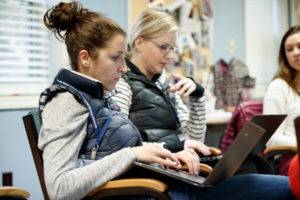 When the ball dropped on January 1 of this year, no one expected the reality that is 2020. COVID-19 is undoubtedly making its mark on history – not just in terms of lives lost but also ways the threat has caused families, businesses, and organizations to alter their everyday lives. For most schools and universities, that has meant a transition from in-person to online learning. Thankfully, Frontier Nursing University (FNU) has been using a distance education model for more than 30 years, causing us to need significantly fewer adjustments than many universities. However, like all organizations, we still needed to reconsider our usual way of life in a few areas.
When the ball dropped on January 1 of this year, no one expected the reality that is 2020. COVID-19 is undoubtedly making its mark on history – not just in terms of lives lost but also ways the threat has caused families, businesses, and organizations to alter their everyday lives. For most schools and universities, that has meant a transition from in-person to online learning. Thankfully, Frontier Nursing University (FNU) has been using a distance education model for more than 30 years, causing us to need significantly fewer adjustments than many universities. However, like all organizations, we still needed to reconsider our usual way of life in a few areas.
We decided to keep an open mind as we innovated new program models and focused on self-care for our students, staff and faculty. We hope that what we have learned in the past few months, combined with our decades of distance education experience can positively impact other educators as the new school year kicks off.
Here are four tips for educators making the switch to online learning during COVID-19:
Don’t Be Afraid to Innovate New Course and Program Models.
It’s unlikely most schools and universities had a “Pandemic Plan” pre-2020 – but when life throws you lemons…well, you know the rest. In the wake of such uncertain times, it’s essential to be willing to adapt usual course models or programs in the interest of student and faculty safety. The adjustments can be challenging, especially for institutions that have operated the same way for decades, but the educators willing to make these changes will thrive.
Although FNU relies on a distance education model, there are also in-person portions of each student’s journey that we quickly realized we needed to redesign effectively. As we began to look at reinventing our in-person programming, we had two main concerns – maintaining a sense of trust and community in the new learning environment and upholding the top-quality education standards that FNU has held for almost 100 years.
To maintain community, we centered our new programs around video technology like Zoom to keep students and educators engaged with each other throughout the experience. We expanded this model by incorporating small groups and break out sessions with an emphasis on team-building and fellowship while still following curriculum guidelines.
Our second challenge was upholding excellence in our courses as we transitioned intensive hands-on skills training to a digital platform. Reimagining activities like instructing students to remove sutures, or asking patients about their medical history without in-person conduct, took great innovation and creativity to remain comprehensive. However, we were ultimately able to meet these goals by working as a team and embracing new technologies. As a school, we were able to provide each student with the physical props needed to train from home in specific procedures and tasks. We then leaned again on Zoom and similar platforms for instruction and have been able to grade accurately through videos of students reenacting the skills taught to them via state-of-the-art simulation programs. We are grateful that the adaptive, persevering nature of our students and staff has allowed us to reinvent some of our most vital programing in a truly successful way.
As the old saying goes – you can’t change the direction of the wind, but you can adjust your sails. Now is the time to reevaluate and make the creative adjustments necessary to keep safety your priority while continuing to provide quality education.
Create a Safe Space for Students to Process.
As educators rush to find ways to maintain valuable student learning, it is also important to remember that another vital element of success lies in mental health. The educators who genuinely care for the wellbeing of their students will stand out from the rest.
Throughout this trying year, FNU instructors have implemented several new ways to check how students are coping mentally as they continuously open up new outlets of connection and communication. Some of the methods FNU instructors have found success in engaging students during this time include message boards, pre-class discussions, and Facebook groups. These tools allow students to vent frustrations, fears, and anxieties. They have also begun spreading inspirational messages, sharing meditation practices, and offering encouragement to one another. This simple digital platform has resulted in a greater sense of community throughout our student body, providing students who may be feeling isolated a place to connect.
How can you support the mental health of your students? Don’t be afraid to leverage social media platforms or new technologies to check in on your student body.
Remember your Own Mental Health.
While your students’ mental health is essential, your staff and faculty’s mental health is just as vital. It is easy to overexert yourself as an educator. To best help students with their educational and mental health needs, you cannot forget to prioritize your well-being.
As one of our nursing instructors, Dr. Vicki Burns, wisely explains, “We cannot hope to bring comfort, community, and support to others if we are trying to access those things from an empty well. We must achieve a healthy work-life balance and care for ourselves physically, spiritually, and emotionally. We must keep as many healing rituals and routines in place as possible under the circumstances, and be careful guardians of what we allow ourselves to dwell upon. What we focus on can quickly become who we are, so we must be vigilant about how we wish that to look.”
Many FNU instructors are involved in the student message boards, but they have also established additional ways to check-in with themselves and their co-workers. Faculty/staff Zoom lunches and support sessions have created a time to vent and chat, email chains of positive messages have offered encouragement, and an overall dedication to checking in and being kind has helped provide stability to our team and, in turn, our students.
Take the time you need to prioritize self-care and implement ways to check in on your colleagues.
Give Grace.
Let us all remember the value of grace during these unsettling times. A Pandemic has a way of bringing life and what really matters into focus.
Throughout the past six months, FNU has been carefully reevaluating our policies and how they impact students in the wake of uncertainty. We’ve adjusted systems to allow for additional flexibility with deadlines, as many of our students are also working out on the Pandemic frontlines.
Dr. Jane Houston, our DNP Program Director, helps us to remember how vital kindness and understanding are this year.
“A little empathy can go a long way,” said Dr. Houston. “Remember how challenging it was to be a student before the advent of COVID-19? We cannot even comprehend what today’s students are going through- balancing work, life, family, school, and possibly illness. Right now, it is our responsibility to balance empathy with rigor.”
The end goal is always for students to get a full-quality education. However, if we can achieve that while giving allowances for the unexpected circumstances of 2020, our students will be better prepared to step into their new nursing roles with a kind heart and a strong spirit.
Give grace to your students. Give grace to your colleagues. Give grace to yourself. We’ll get through this together!
For more information on ways that FNU is continuing to enhance student education and promote our students, faculty, and staff, visit our blog and COVID-19 updates page.
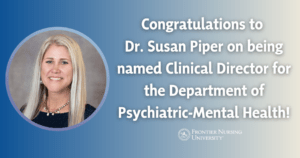

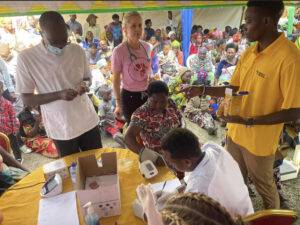
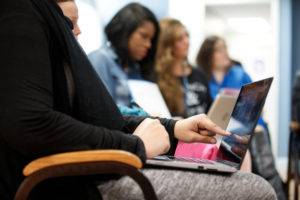 While
While  The Frontier community is proud to have students and alumni serving on the frontlines of the COVID-19 pandemic. We are committed to sharing their stories in order to provide insight, hope, and encouragement. Thank you to all the health care workers who are risking their own well-being daily to serve our nation.
The Frontier community is proud to have students and alumni serving on the frontlines of the COVID-19 pandemic. We are committed to sharing their stories in order to provide insight, hope, and encouragement. Thank you to all the health care workers who are risking their own well-being daily to serve our nation. 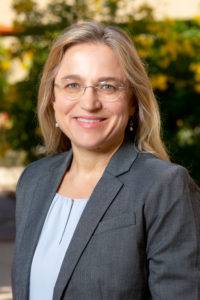 The Frontier community is proud to have students and alumni serving on the frontlines of the COVID-19 pandemic. We are committed to sharing their stories in order to provide insight, hope, and encouragement. Thank you to all the health care workers who are risking their own well-being daily to serve our nation.
The Frontier community is proud to have students and alumni serving on the frontlines of the COVID-19 pandemic. We are committed to sharing their stories in order to provide insight, hope, and encouragement. Thank you to all the health care workers who are risking their own well-being daily to serve our nation. 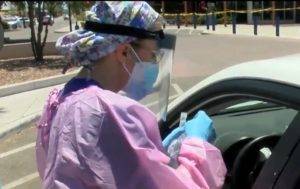 The pandemic has required our team to examine institutionalized patterns, habits, and workflows.
The pandemic has required our team to examine institutionalized patterns, habits, and workflows. 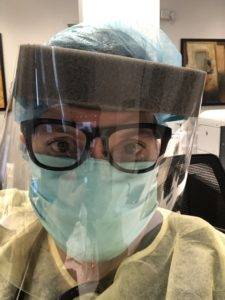 Everyone understands that working on the front lines of the COVID-19 Pandemic comes with inherent risk. Working as a nurse practitioner at Metro Immediate and Primary Care, which is part of the George Washington University Medical Faculty Associates, in Washington, D.C., Michelle Cochran, MSN, FNP, Class 71, experienced that risk first hand. When the pandemic hit, her clinic began providing assessment and testing for COVID-19 to help ease some of the demand on the hospital. Then, in April, she tested positive for the coronavirus.
Everyone understands that working on the front lines of the COVID-19 Pandemic comes with inherent risk. Working as a nurse practitioner at Metro Immediate and Primary Care, which is part of the George Washington University Medical Faculty Associates, in Washington, D.C., Michelle Cochran, MSN, FNP, Class 71, experienced that risk first hand. When the pandemic hit, her clinic began providing assessment and testing for COVID-19 to help ease some of the demand on the hospital. Then, in April, she tested positive for the coronavirus.  Sometimes “answer the call” means literally answering the call. When the Federal Emergency Management Agency (FEMA) called this spring, Julian Williams, RN, CMSRN, FNP-C, Bridge 144, answered. Julian was already on a FEMA assignment at the Woodhull Medical Center of Brooklyn where he was working in the inpatient internal medicine department when the pandemic swept the country and FEMA contacted him for COVID-19 disaster response. He began working at Coler Rehabilitation and Nursing in New York City.
Sometimes “answer the call” means literally answering the call. When the Federal Emergency Management Agency (FEMA) called this spring, Julian Williams, RN, CMSRN, FNP-C, Bridge 144, answered. Julian was already on a FEMA assignment at the Woodhull Medical Center of Brooklyn where he was working in the inpatient internal medicine department when the pandemic swept the country and FEMA contacted him for COVID-19 disaster response. He began working at Coler Rehabilitation and Nursing in New York City.  One of the mysteries of the coronavirus is how it impacts people differently. It is fatal in some, while others display few if any symptoms. Life in the midst of the pandemic impacts everyone differently as well. Some have experienced the loss of work, some have missed out on major life events like weddings and graduations, and some continue to face the risks in service to others.
One of the mysteries of the coronavirus is how it impacts people differently. It is fatal in some, while others display few if any symptoms. Life in the midst of the pandemic impacts everyone differently as well. Some have experienced the loss of work, some have missed out on major life events like weddings and graduations, and some continue to face the risks in service to others. 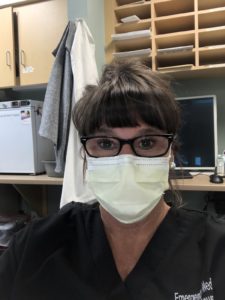 “The COVID-19 pandemic has been especially scary for us in the ER as we see all types of sick patients,” said Tammy. “However, I have always felt very safe and secure at my work. We have been appropriately educated and have had all of the PPE we need. My education and years of nursing experience have helped to prepare me for taking care of this very sick population.”
“The COVID-19 pandemic has been especially scary for us in the ER as we see all types of sick patients,” said Tammy. “However, I have always felt very safe and secure at my work. We have been appropriately educated and have had all of the PPE we need. My education and years of nursing experience have helped to prepare me for taking care of this very sick population.”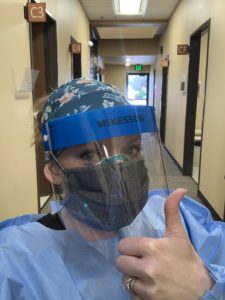 In times of crisis, it is easy to see the bad; however, it is during these times that finding the good is the most important. During the COVID-19 pandemic, we are fortunate to be able to celebrate the heroic efforts of those on the front lines. One of those heroes is
In times of crisis, it is easy to see the bad; however, it is during these times that finding the good is the most important. During the COVID-19 pandemic, we are fortunate to be able to celebrate the heroic efforts of those on the front lines. One of those heroes is 

 Dr. Nikia Grayson, DNP, MSN, MPH, MA, CNM, FNP-C, FACNM (she/her) is a trailblazing force in reproductive justice, blending her expertise as a public health activist, anthropologist, and family nurse-midwife to champion the rights and health of underserved communities. Graduating with distinction from Howard University, Nikia holds a bachelor’s degree in communications and a master’s degree in public health. Her academic journey also led her to the University of Memphis, where she earned a master’s in medical anthropology, and the University of Tennessee, where she achieved both a master’s in nursing and a doctorate in nursing practice. Complementing her extensive education, she completed a post-master’s certificate in midwifery at Frontier Nursing University.
Dr. Nikia Grayson, DNP, MSN, MPH, MA, CNM, FNP-C, FACNM (she/her) is a trailblazing force in reproductive justice, blending her expertise as a public health activist, anthropologist, and family nurse-midwife to champion the rights and health of underserved communities. Graduating with distinction from Howard University, Nikia holds a bachelor’s degree in communications and a master’s degree in public health. Her academic journey also led her to the University of Memphis, where she earned a master’s in medical anthropology, and the University of Tennessee, where she achieved both a master’s in nursing and a doctorate in nursing practice. Complementing her extensive education, she completed a post-master’s certificate in midwifery at Frontier Nursing University.









 Dr. Tia Brown McNair is the Vice President in the Office of Diversity, Equity, and Student Success and Executive Director for the Truth, Racial Healing, and Transformation (TRHT) Campus Centers at the American Association of Colleges and Universities (AAC&U) in Washington, DC. She oversees both funded projects and AAC&U’s continuing programs on equity, inclusive excellence, high-impact practices, and student success. McNair directs AAC&U’s Summer Institutes on High-Impact Practices and Student Success, and TRHT Campus Centers and serves as the project director for several AAC&U initiatives, including the development of a TRHT-focused campus climate toolkit. She is the lead author of From Equity Talk to Equity Walk: Expanding Practitioner Knowledge for Racial Justice in Higher Education (January 2020) and Becoming a Student-Ready College: A New Culture of Leadership for Student Success (July 2016 and August 2022 Second edition).
Dr. Tia Brown McNair is the Vice President in the Office of Diversity, Equity, and Student Success and Executive Director for the Truth, Racial Healing, and Transformation (TRHT) Campus Centers at the American Association of Colleges and Universities (AAC&U) in Washington, DC. She oversees both funded projects and AAC&U’s continuing programs on equity, inclusive excellence, high-impact practices, and student success. McNair directs AAC&U’s Summer Institutes on High-Impact Practices and Student Success, and TRHT Campus Centers and serves as the project director for several AAC&U initiatives, including the development of a TRHT-focused campus climate toolkit. She is the lead author of From Equity Talk to Equity Walk: Expanding Practitioner Knowledge for Racial Justice in Higher Education (January 2020) and Becoming a Student-Ready College: A New Culture of Leadership for Student Success (July 2016 and August 2022 Second edition).